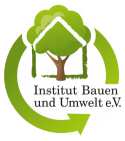The IBU Board
The IBU’s more than 300 members are companies and associations from more than twenty different countries. Although they possess a common goal of making construction more sustainable, this results in a variety of different interests and opinions – not least, because of the different – and sometimes competing – industries. Precisely this type of diversity within the building materials and construction product sectors is represented by the fifteen members of the IBU board. They include shareholders, executives, and association representatives. The result is that the work undertaken by the board is based upon a broad range of competencies and that strategic decisions are made in consensus, taking into account the varying perspectives.
Milestones of the IBU Strategy:
- The IBU provides information about its EPD programme and its commitment to sustainable construction and has already achieved a high level of recognition. Thanks to this commitment and to the education it provides about the environmental dimension of sustainability, along with the transparency of all of its procedures, the IBU enjoys a high level of acceptance.
- The IBU is in constant dialogue with representatives from the business, science, standardisation, and political sectors and participates in various committees throughout Germany and Europe to promote sustainable building.
- The continuous updating of the EPD programme leads to increasing international recognition of IBU EPDs.
- As co-founder of the ECO Platform, the IBU is working to implement a uniform Europe-wide approach to providing sustainability information for building products, construction materials, and building components.
- The IBU was intensively involved in achieving agreement on a harmonised standard for all construction products, which forms the basis for all EPDs in the European Union.
- The IBU participated in the practical adaptation of existing international standards to the construction industry in Germany and continues to be involved in this project.
- Thanks to the EPD Online Tool, the creation and verification process for EPDs is now done online. The IBU has thereby made it easy for manufacturers to create EPDs, and is also continually working to optimise this tool. For example, EPD content is now machine-readable, making it easier for users to further process the data.
- The IBU has digitised sustainability information: On the IBU.data platform, data from the life cycle assessments of construction product manufacturers’ EPDs is available in XML files based on the ILCD format (International Reference Life Cycle Dataset) that has been expanded for EPDs.
- The IBU continually gains new members, offering them comprehensive services related to specific tasks in EPD creation as well as supporting them in their communications and public relations efforts.
The members of the Institut Bauen und Umwelt e.V. board are:
The Institut Bauen und Umwelt e.V. is represented by:

Dr. Barbara Hendricks,
Former Federal Minister
President of IBU
The Institut Bauen und Umwelt e.V. is managed by:

Florian Pronold,
Former Parliamentary State Secretary
Managing Director of IBU
Milestones of the IBU Strategy:
- IBU provides information about its EPD programme and its commitment to sustainable construction and has already achieved a high level of recognition. Thanks to this commitment and to the education it provides about the environmental dimension of sustainability, along with the transparency of all of its procedures, the IBU enjoys a high level of acceptance.
- IBU is in constant dialogue with representatives from the business, science, standardisation, and political sectors and participates in various committees throughout Germany and Europe to promote sustainable building.
- The continuous updating of the EPD programme leads to increasing international recognition of IBU EPDs.
- As co-founder of the ECO Platform, the IBU is working to implement a uniform Europe-wide approach to providing sustainability information for building products, construction materials, and building components.
- IBU was intensively involved in achieving agreement on a harmonised standard for all construction products, which forms the basis for all EPDs in the European Union and participates in the practical adaptation of existing international standards to the construction industry in Germany.
- Thanks to the EPD Online Tool, the creation and verification process for EPDs is now done online. The IBU has thereby made it easy for manufacturers to create EPDs, and is also continually working to optimise this tool. For example, EPD content is now machine-readable, making it easier for users to further process the data.
- IBU has digitised sustainability information: On the IBU.data platform, data from the life cycle assessments of construction product manufacturers’ EPDs is available in XML files based on the ILCD format (International Reference Life Cycle Dataset) that has been expanded for EPDs.
- IBU continually gains new members, offering them comprehensive services related to specific tasks in EPD creation as well as supporting them in their communications and public relations efforts.

















